On the morning of November 28th, the International Symposium on Language Testing and Assessment was held in the library lecture hall, north campus of GDUFS. The conference was jointly organized by Guangdong University of Foreign Studies and the Test Center of Ministry of Education, and was undertaken by the Foreign Linguistics and Applied Linguistics Research Center of Humanities and Social Science Key Research Base of the Ministry of Education. The theme of the symposium was research on foreign language ability assessment systems. The scope of discussion included studies on the scale of foreign language ability; language evaluation standard; China's foreign language exam reform; formative assessment in foreign language teaching; standard-based foreign language teaching and assessment, and some other research projects. This symposium attracted more than 260 scholars from universities and research institutions at home and abroad, including more than 30 scholars from well-known colleges and universities and experts from international education agencies coming from more than ten countries and regions such as Britain, the United States, Canada, Russia, Singapore, Turkey, Vietnam, Indonesia and Nigeria.
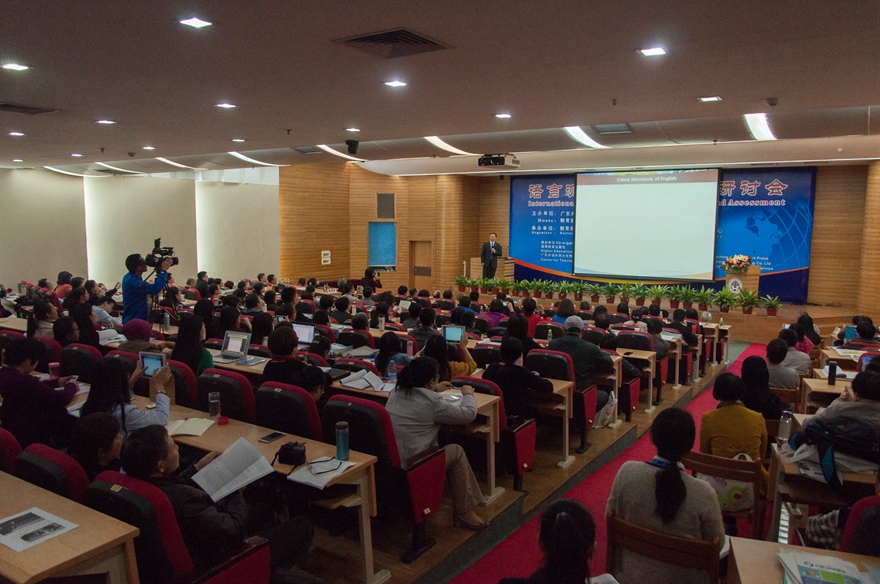
The Opening Ceremony of the International Symposium on Language Testing and Assessment
Guests that attended this symposium were JIANG Gang, Director of the Test Center of the Ministry of Education; ZHONG weihe, President of GDUFS; Liu jianda, Vice President of GDUFS; John DE Jong, Development Director of the PISA (Program for International Student Assessment) Project Framework of Economic Partnership and Development Organization and Vice President of Pearson; Nick Saville, Chairman of European Language Testers Association and Test Research and Development Director of the University of Cambridge Examination Committee; Barry O'Suville, Senior Assessment Adviser and Chief Expert of British Culture Education Association; Professor GUI Shichun of GDUFS and pioneer of linguistics and applied linguistics in China; Professor YANG Huizhong from Shanghai Jiao Tong University. The Opening Ceremony was hosted by LIU Jianda.
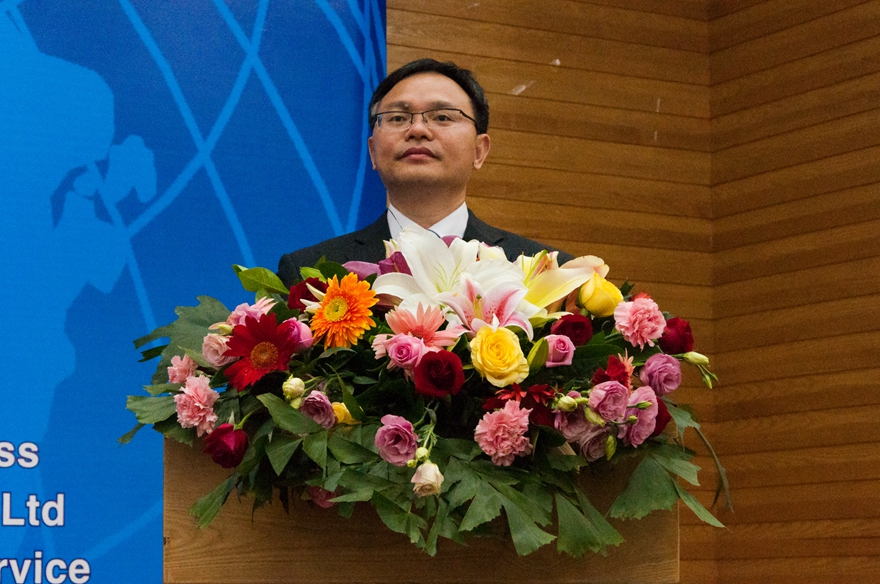
The Opening Ceremony was hosted by LIU Jianda.
President ZHONG Weihe delivered the opening speech. First of all, he welcomed the visiting guests on behalf of GDUFS. He pointed out that our university is a key provincial university of Guangdong province with a distinct characteristic of internationalization. It is an important base in South China for internationalized talent training, foreign language and culture, foreign economic relations and trade and international strategic studies. Since the foundation of the university, GUI Shichun, LI Xiaoju and other famous scholars gathered there teaching and doing research, which has accumulated rich spiritual and cultural wealth for the university. In addition, he also introduced the Foreign Linguistics and Applied Linguistics Research Center in our university. The Center is the Humanities and Social Science Key Research Base of Ordinary Universities under the Ministry of Education. It has achieved fruitful scientific research results. Since foundation, it has actively participated in a series of national and provincial projects. It has made important achievements in language testing, second language acquisition, psychological linguistics, pragmatics, corpus linguistics, and many other fields, winning several national and provincial level programs.
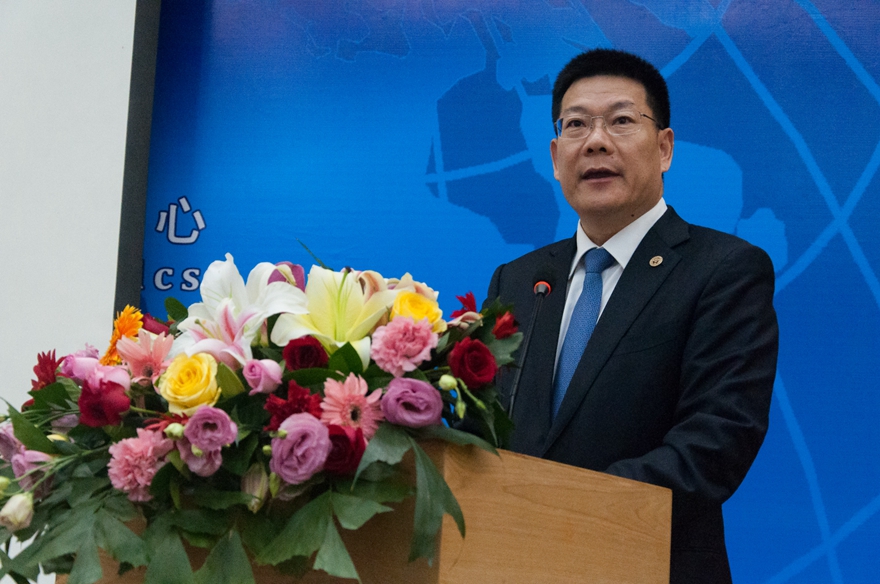
A speech presented by ZHONG Weihe
JIANG Gang pointed out that during the period of "Thirteenth Five-Year Plan", we will speed up the research and development of the English ability rating scale in China, properly put forward a national English proficiency exam, actively promote the reform of the content and form of foreign language exam, improve the standard of quality of foreign language tests, gradually implement the evaluation system of combined formative assessment and summative assessment, and build up modern foreign language ability assessment system with Chinese characteristics by 2020, in order to support foreign language teaching reform, promote classified examination and enhance foreign language education results.
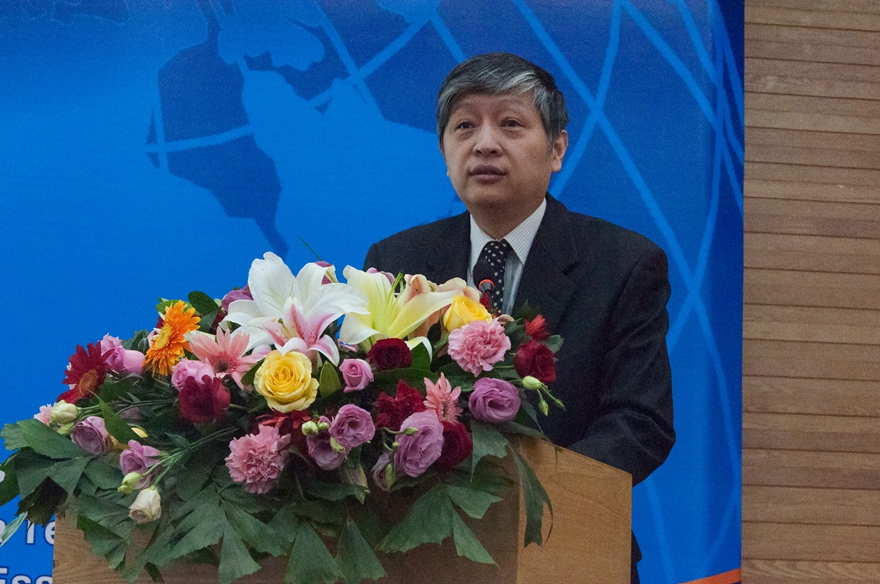
JIANG Gang described the purpose of this symposium
JIANG Gang said when interviewed by a reporter that an important purpose of hosting this International Symposium on Language Testing and Assessment was to show the achievements we have made in foreign language ability testing and assessment system and to listen to the opinions and suggestions of experts and scholars on this system. He hoped that the construction of the scale can play three roles: one is to guide the teaching work to be carried out according to the law of development of language education and teaching; second is to promote learning by examinations, letting the examination grading guide teaching and test teaching results; third is to tell learners what kind of standard they can achieve through different stages of language learning, and to provide reference for their future development so as to help them set more specific learning goals. Currently, the construction of the scale is integrated, but we should seek breakthroughs in key areas, combining the examination that covers the widest range of present teaching with the examination of most people and the examination of most social care into an integrated system. There still exists periodic system differentiation phenomena in our education system today, which is easy to cause the different stages of learning content and learning requirements to overlap and is less systematic. Setting up a foreign language assessment system is to ensure that China's education is systemic, to improve the effectiveness of teaching and learning, to avoid repetition of learning and repeated examinations and to make the standard clearer and more unified and coordinated. The establishment of this system is also aimed at achieving the purpose of "one exam and multipurpose", providing a corresponding standard according to different industry demands for talents in listening, speaking, reading, writing and translation, making the examination results represent the learners' ability level more accurately.
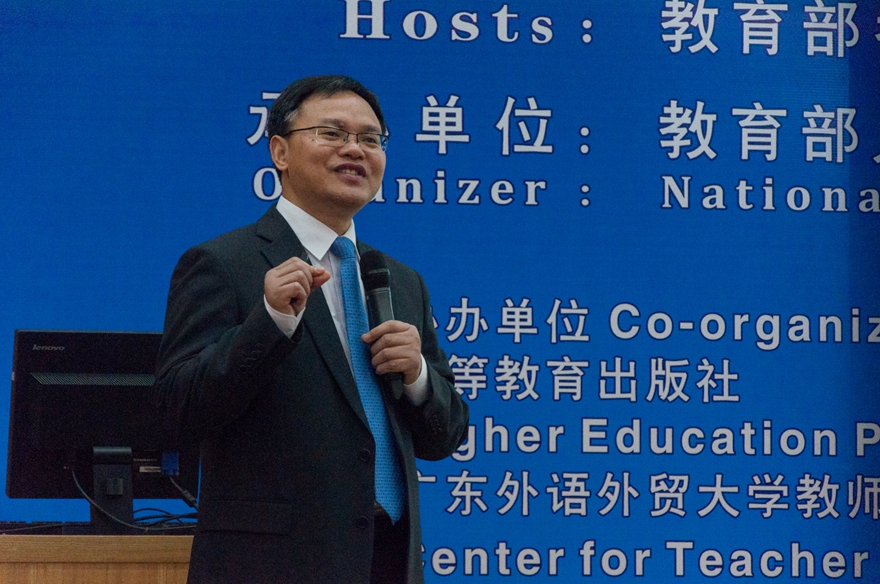
Professor LIU Jianda reported the results of Chinese English ability rating scale research
In the keynote session, Professor LIU Jianda, our Vice President, Director of the Foreign Linguistics and Applied Linguistics Research Center, Chief Expert of Chinese English rating scale research team, together with nine team leaders (or on behalf of the team leader) reported the results of the scale research. Professor LIU pointed out that Chinese English rating scale is the theoretical basis of national foreign language ability assessment system and will be the unified standard in English teaching and assessment. He introduced the innovations of the scale: one is based on national conditions and, facing internationally, we pay attention to the scientific nature and practicality and prospective nature of the scale. On the basis of investigating and analyzing the current situation of the learners' English level and of talent demands of our social and economic development, it makes prescriptive description for English learning, teaching and assessment of all types and at all levels. Two is that it reflects the reform direction of China's foreign language education and teaching and language use in scale location. It focuses on learners’ ability of language meaning comprehension and expression in language use, in order to promote the cultivation of learners' language communication ability; it pays attention to the development of language learners' cognitive ability, the promoting effects language learning makes on the development of thinking ability, and the cultivation of autonomous learning ability and the development of cultural consciousness, which embodies the connotation of the core quality of the English subject. Three is that it has built up a "communication strategy scale", and guide foreign language teaching to strengthen the cultivation of the ability of language use and learning strategy. Four is that it has built up a "pragmatic ability" scale, promoting English teaching in China to cultivate students’ practical ability to use language and cultural awareness and intercultural communicative competence training. Five is that it has built up a translation and interpretation ability scale, filling the blank of translation ability in domestic and foreign language ability scale.
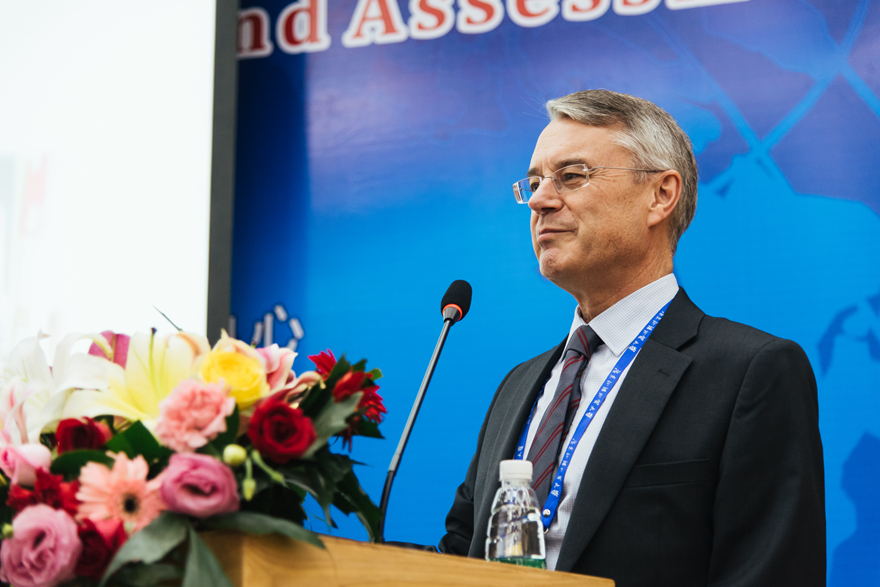
Nick Saville showing the research results of establishing the language testing and evaluation criteria
On behalf of his team, Nick Saville showed their research results in establishing evaluation criteria for language testing. He put forward that based on a widely recognized language testing framework, the learning goals of students become more clear, the direction of teacher’s teaching evaluation becomes more definite, and the results of language testing and evaluation will be more efficient and correct.
Barry O’Sullivan gave a speech about some problems faced by teachers in language testing and evaluation and measures aimed to address these problems. He thought that the main problems faced by teachers were: the confirmation of testing targets, the requirements of testing and evaluation, the measures of organization and management for testing and evaluation and the ways to handle the results of testing and evaluation. As for these problems, he also shared some solutions adopted by the British Council, namely ensuring tests that conform to language and cultural requirements.
On November 29th, the International Symposium on Language Testing and Assessment ended at the lecture hall of the library on the north campus of GDUFS. Professor Cheng Liying, the Yunshan Scholar of GDUFS, Professor John de Jong, the vice president of Pearson, and Professor Gui Shichun, the vice president of the National Foreign Language Teaching Research Association made keynote speeches respectively.
Professor Cheng Liying expressed her own views on the purpose, impacts and the development direction of classroom teaching evaluation. She thought that most of the information obtained by students about study, their future and themselves is from classroom teaching evaluation. Similarly, parents’ and teachers’ understanding of children are also from the classroom teaching evaluation. Teachers convey their expectations to students, and students will make these expectations into reality by providing feedback, thus knowing what is important to learn and whether they grasp the important knowledge. When it comes to the classroom teaching evaluation in China, she said: “the classroom teaching valuation in our country lacks powerful theoretical direction. Classroom teaching evaluation should be viewed as a bridge connecting teaching and learning, thus supporting students to learn more efficiently. Therefore, teachers should ensure that students are able to establish contact with you and accept what they have been taught. By doing so, students can realize the importance of learning and will learn more actively.”
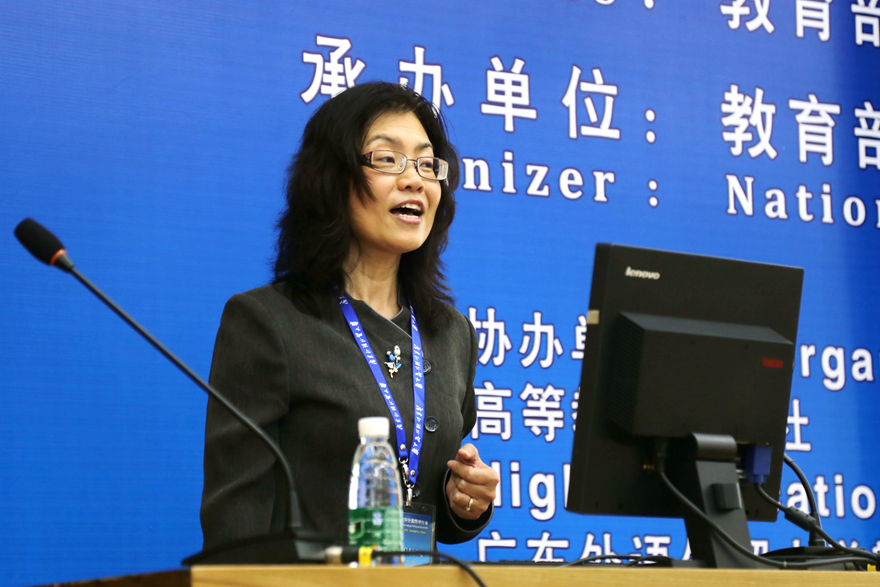
Professor Cheng Liying giving a keynote speech
Professor John de Jong, firstly, showed the general development situation of PISA (Program for International Student Assessment), and introduced the classification methods of its measurement system of foreign language ability and some existing problems in actual operation, such as the comprehending deviation of users due to the shortage of descriptive words. He thought that the key targets of educational reform at present are to realize the needs of course building, define the learning goals correctly, set up coherent and viable courses and improve students’ learning interests. As for improving students’ learning interests, he stressed that the key is letting students reap great rewards from learning. He also analyzed the language proficiency required by some careers and in various language contexts through some charts.
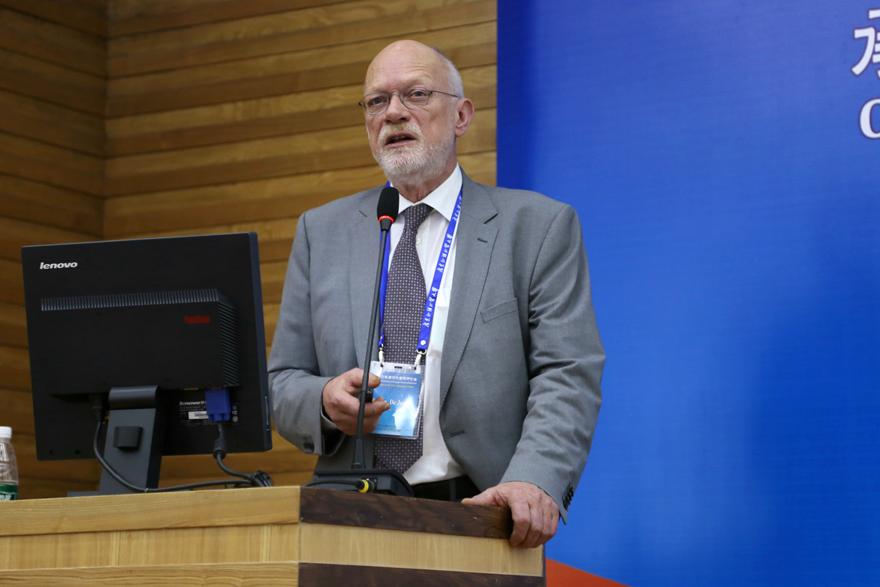
Professor John de Jong discussing the key targets of educational reform
Professor Gui Shichun, based on the two articles “Reconsideration of English Education in Our Country - Chapter of Theories” and “Reconsideration of English Education in Our Country - Chapter of Practice”, analyzed his reconsideration about English education in our country for the guests. In the chapter of theories, Professor Gui discussed the debate about the ability and application of language in modern linguistics and showed a series of research results based on this debate. These theories have far-fetched influences on language research and teaching and form the starting point of English educational reform in our country. In the chapter of practice, he also discussed the new pattern of the internationalization of English, his query about the classification of native speakers and non-native speakers, the ownership of English and the ultimate goal of learning.
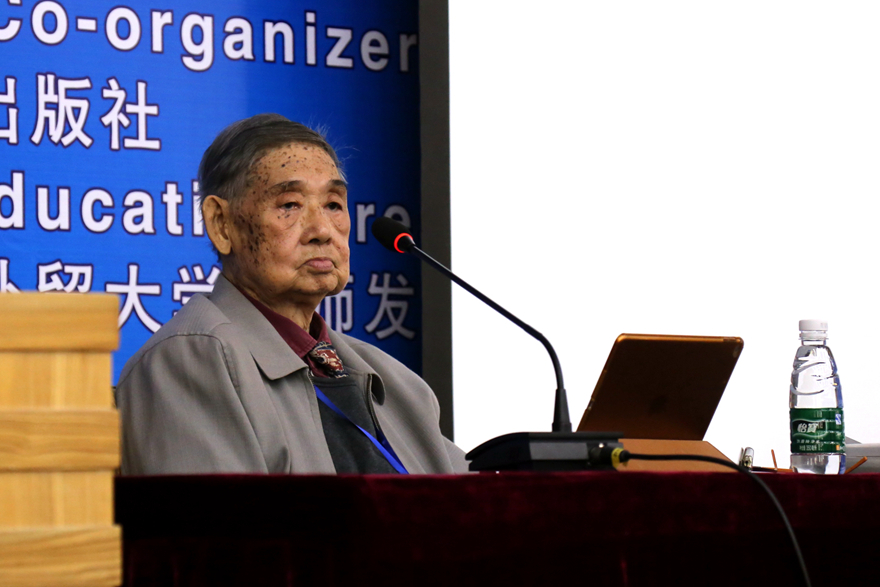
Professor Gui Shichun talking about his reconsideration of English education
Dr. Yang Jing gave a brief conclusion in the closing ceremony, and expressed heartfelt thanks to every unit that supported the holding of this symposium.
There were 24 sessions of group reports in the symposium. Representatives present at the meeting discussed different topics from various respects and were eagerly looking forward to the bright prospect of foreign language testing and evaluation system in our country. The system also has attracted the attention of many media. On the opening day, many mainstream media such as China Daily, PhonenixNet, NetEase News and China Youth News rebroadcast and covered this spectacular event.

